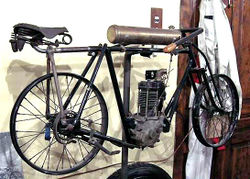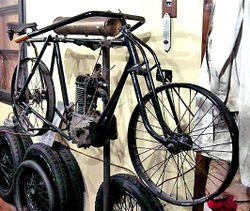Difference between revisions of "Marchand"
m |
m |
||
| Line 1: | Line 1: | ||
{{X}} | {{X}} | ||
| − | |||
| Line 12: | Line 11: | ||
== Motorcycels == | == Motorcycels == | ||
| − | + | [[Image:Velocipedi Milano Orio e Marchand.jpg|thumb|left|200px|'''Old Ad Poster from the early 1900's''']] | |
[[File:1901 Marchand F.Lli 1.jpg|thumb|right|250px|'''1901 Marchand F.Lli''']] | [[File:1901 Marchand F.Lli 1.jpg|thumb|right|250px|'''1901 Marchand F.Lli''']] | ||
[[File:1901 Marchand F.Lli 2.jpg|thumb|right|250px|'''1901 Marchand F.Lli''']] | [[File:1901 Marchand F.Lli 2.jpg|thumb|right|250px|'''1901 Marchand F.Lli''']] | ||
Revision as of 08:56, 1 November 2010
1898 - 1909
Automobiles
Orio Marchand was founded in 1889, a based Musocco (Milan) company, started by the brothers Paul Marchand and Leo Marchand, and later the company transferred to Piacenza. Orio Marchand was a bicycle and sewing machine manufacturer based in Piacenza and in 1898 started the manufacture of automobiles. At the turn of the century the first produced motorcar was under license from (Decauville) and designs where exchanged, which in 1906 came on the market and was under the Fratelli Marchand name. In 1906 the company joined with Dufaux to become Marchand & Dufaux and was together until 1909, producing four and six cylinder models. In 1909 the registry of the Piacenza company was erased from operation.
Motorcycels
After the entering of Attilio Orio, the company began production of motorcycles and became one of the most famous in Italy, thanks to the sporting triumphs of Joseph Tamagni. In 1901, they exhibited in Milan a bike with a 1.75 hp motor that was battery powered, and became the "Magnet" the next year. The engine was mounted in place of the seat post tube, putting into motion is a knob, the change to two reports. The engine of the model of 1902 was tilted along the tube to the pedal, which was curved at the bottom to accommodate the engine. In 1903, the bike had the engine mounted vertically in front of the pedal with a type of bicycle frame. In 1905, the model was single-cylinder engine with vertical valves with an automatic transmission, the carburetor was at a constant level, the ignition of the Magnet version 2.5 and 3.5 hp. The engine was cradled at the center of the frame tubes, with the front fork was elasticly dampend, the transmission had a belt, with shoe brakes on two of the wheels. According to some sources, the company disappeared in 1907, while according to others it happend in 1910.
In 1910, Giuseppe Merosi who had been previously employed by Orio Marchand then Fiat and Bianchi and went on to work for A.L.F.A..
Send what you have to:
| Car Information and Photos by Marque: A - B - C - D - E - F - G - H - I - J - K - L - M - N - O - P - Q - R - S - T - U - V - W - X - Y - Z |
| Motorcycle Information and Photos by Marque: A - B - C - D - E - F - G - H - I - J - K - L - M - N - O - P - Q - R - S - T - U - V - W - X - Y - Z |


